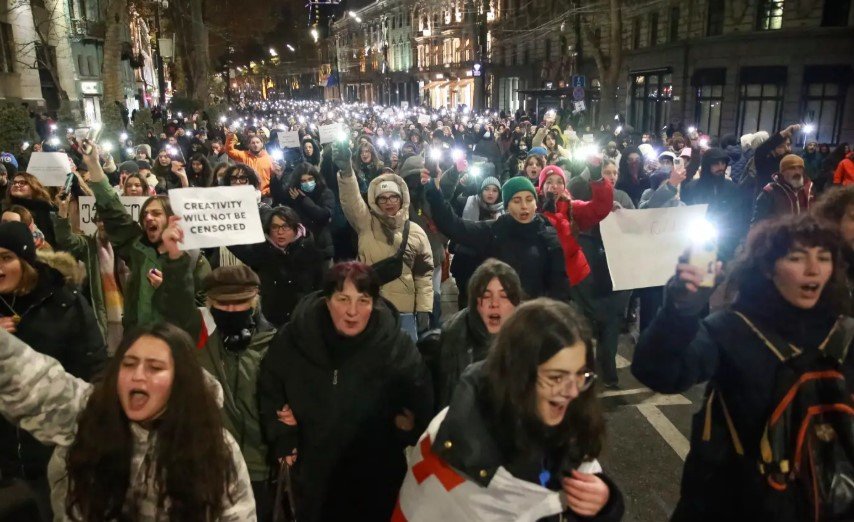In a move that has sparked significant political upheaval, Mikheil Kavelashvili, a former soccer player with a controversial reputation, was elected as the new president of Georgia on Saturday. The election, which has raised concerns about the country’s future EU aspirations, also signals a strengthening of the ruling Georgian Dream party’s control, and critics say it could tilt the country’s political alignment closer to Moscow.
A Controversial Election
Kavelashvili, who gained fame as a forward for English Premier League champions Manchester City, was the only candidate on the ballot. His victory was all but assured, thanks to the Georgian Dream’s dominance over a 300-seat electoral college that replaced direct presidential elections in 2017. The electoral college is made up of members from the Georgian Parliament, municipal councils, and regional legislatures, many of whom are loyal to the ruling party.
Critics have lambasted the election process, accusing Georgian Dream of manipulating the system to ensure Kavelashvili’s rise to power. The opposition claims that the vote was heavily influenced by Moscow, further aligning Georgia with its former imperial ruler. For many protesters, this is seen as a significant blow to Georgia’s hopes of joining the European Union.

Protests and Accusations of Authoritarianism
The announcement of Kavelashvili’s victory has sparked widespread protests across Georgia. Thousands of anti-government demonstrators have taken to the streets of Tbilisi, the capital, accusing the ruling party of undermining democracy. Many have described Kavelashvili as a “puppet” of Bidzina Ivanishvili, the billionaire founder of the Georgian Dream party, who is widely believed to be the real power behind the scenes in Georgian politics.
One protester, historian Nika Gobronidze, expressed his discontent by drawing a comparison between Ivanishvili and the Roman Emperor Caligula, who famously appointed his horse as consul. Gobronidze argued that Ivanishvili was using Kavelashvili as a tool to further his own political agenda. The sense of disillusionment is palpable, as many Georgians fear that the election results will only deepen the country’s authoritarian slide and diminish its prospects for a future aligned with European values.
Tensions with the West
Kavelashvili’s election comes at a time of rising tension between Georgia and the West, particularly the European Union. Pro-Western parties, including the outgoing president Salome Zourabichvili, have denounced the process, calling for a rerun of the election and a return to democratic norms. Zourabichvili, who has served as president since 2018, has made it clear that she will not step down when her term expires on December 29.
Zourabichvili, whose policies have been firmly pro-European, took to social media to assert her legitimacy, declaring that her mandate as president continues in the absence of a legitimate parliament. “I remain your president — there is no legitimate parliament and thus no legitimate election or inauguration,” she wrote. Her stance has fueled further division and unrest, with the opposition rallying behind her as the true representative of Georgia’s European aspirations.
Georgian Dream’s Shift Toward Russia
The Georgian Dream party, despite its outward claims of wanting to join the EU, has been increasingly criticized for its pro-Russian stance. The party’s decision to suspend EU accession talks last month has fueled allegations that it is becoming more aligned with Russia. Critics point to recent laws that mirror those seen in Russia, particularly those that target freedom of speech and LGBTQ+ rights, as evidence of this drift.
Kavelashvili’s election and the party’s growing ties with Moscow have left many Georgians fearing for their democratic future. The pro-Western opposition, led by figures such as Zourabichvili, remains steadfast in its call for a pro-European course, hoping that international pressure will help steer the country back on track.
The Road Ahead for Georgia
As Kavelashvili prepares to be inaugurated on December 29, Georgia stands at a crossroads. The protests in Tbilisi signal deep divisions within the country, and the international community will be watching closely to see how the political crisis unfolds. Many in Georgia fear that the country’s European dreams may slip further out of reach, with the looming shadow of Russian influence casting a long pall over its future.
